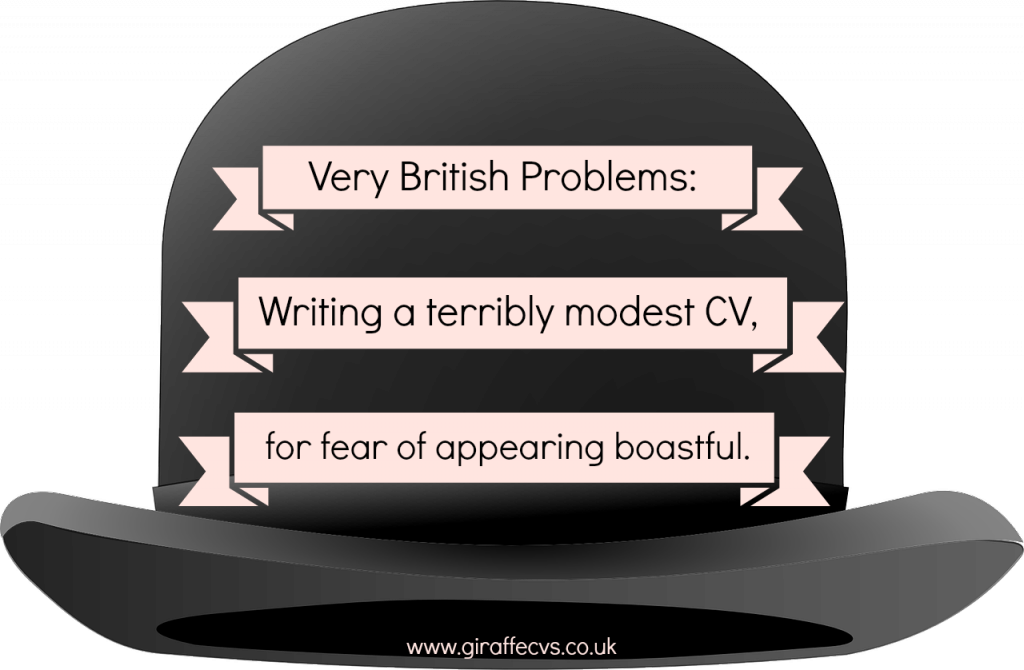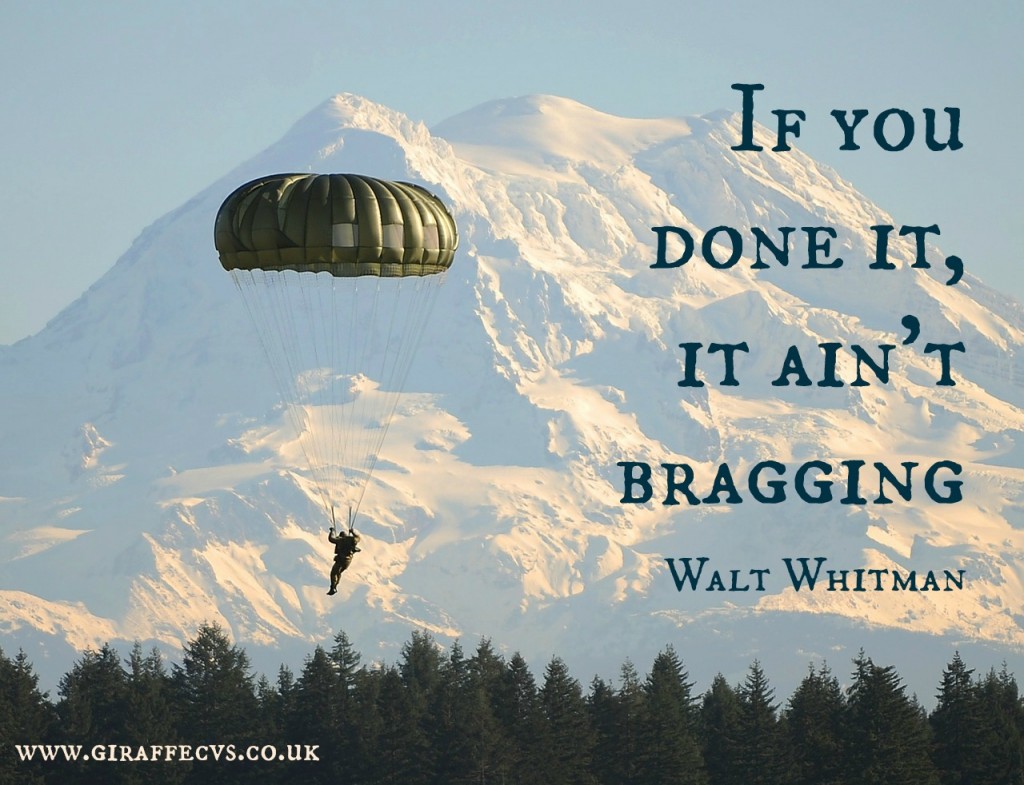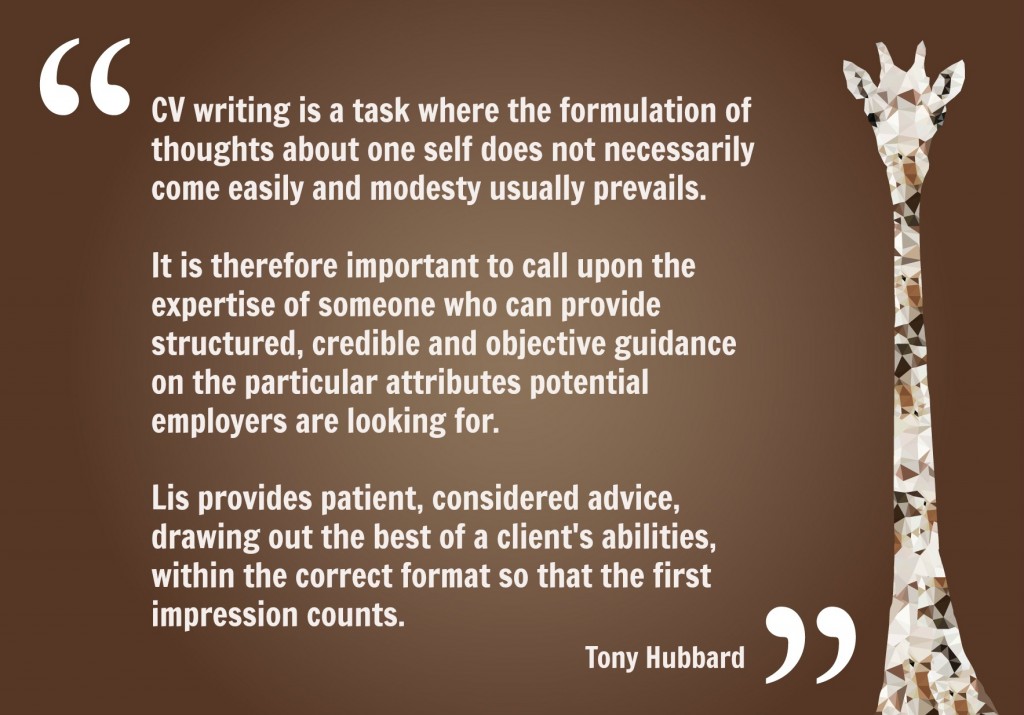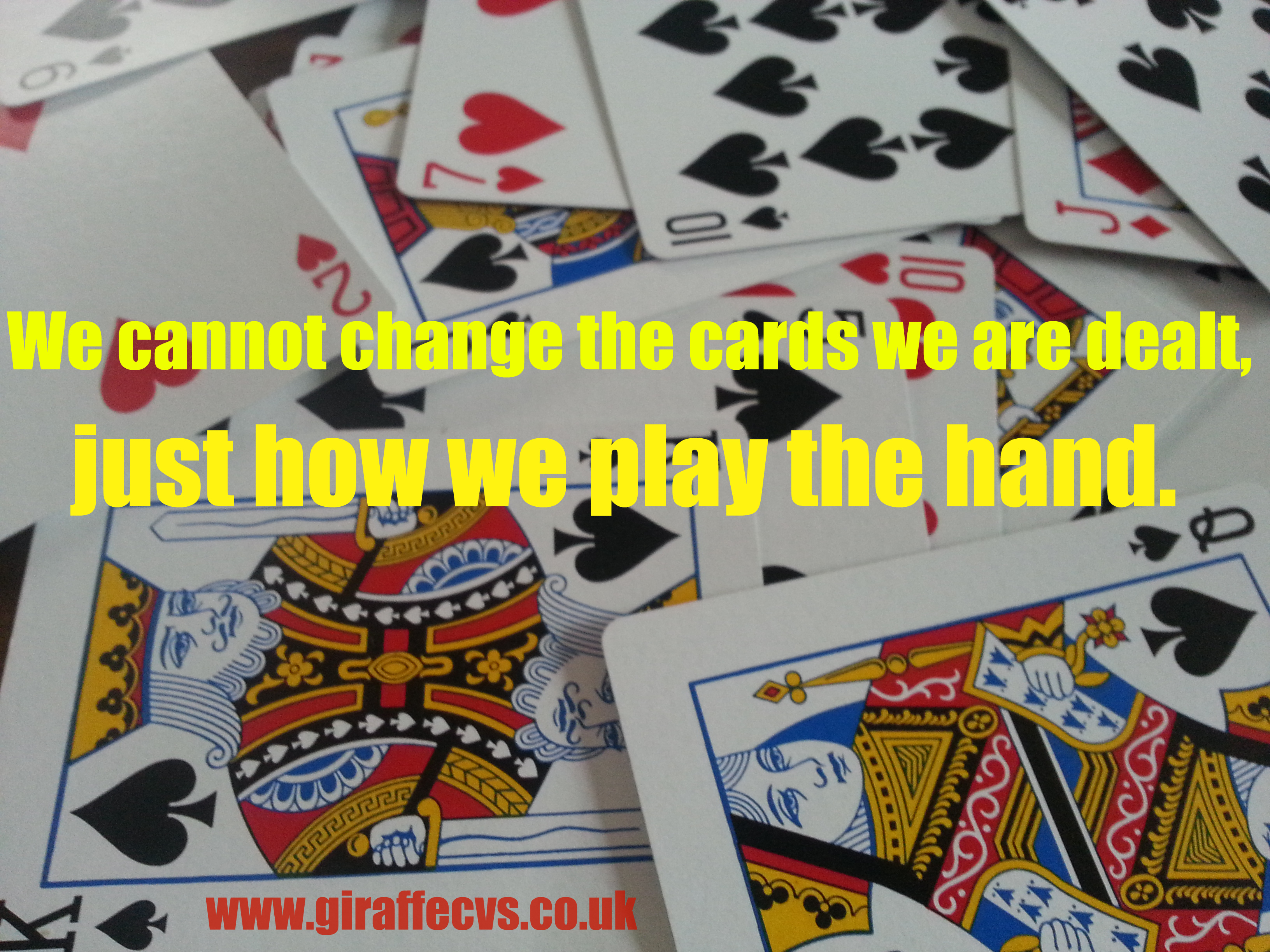
by Lis McGuire | Dec 24, 2013 | CV tips, Graduate CV tips, News
Are you wondering how on earth you can use your CV to sell yourself when the basic elements take up so much space?
 When I’m writing a CV, space is at a premium. I have to be totally aware of what is important and absolutely ruthless about what is not. With only two pages to play with, careful planning is a must, and every word needs to be considered and reconsidered before it makes the grade and gets admitted to the high society of your premium two-page space.
When I’m writing a CV, space is at a premium. I have to be totally aware of what is important and absolutely ruthless about what is not. With only two pages to play with, careful planning is a must, and every word needs to be considered and reconsidered before it makes the grade and gets admitted to the high society of your premium two-page space.
This week’s blog names and shames the top five CV space eaters which stop people shaping a compelling, interview-winning two page document.
1. Contact details
As these are often the first thing that gets written down on a CV, people often get drawn in to making their name, address, telephone numbers and email addresses look all fancy schmancy. This is all well and good but, before you know it, you’ve eaten up a good quarter to half a page of your CV without having yet presented any information that will convince a recruiter they need to call you. Sure, they’ll know HOW to contact you, but not why they should.
2. Too much detail on older or irrelevant job roles
Unwillingness to let go of finer details relating to older roles and roles that are not directly relevant can result in another huge space eater on your CV. See my previous blog Five top tips to get rid of the CV flab for more detail on how and why you should ditch the excess in this area.
3. Replicated sections
I quite often see CVs which restate information in different sections, with the same points repeated in Key Skills, Achievements and Experience section. This is unnecessary and confusing for the reader. Say it well and you’ll only need to say it once. I advise making each section of your CV work harder for you by giving it a specific job.
Your key skills, for example, can be used to outline the transferable business skills you can bring to a new employer. I find using snappy bullets in a columned format makes it easier for the reader to skim over quickly and get a feel for your transferable business skills, before reading on. I myself don’t tend to feature Achievements as a separate section on the CVs I write. Instead, I use the Experience section to outline key accomplishments within the context of each role undertaken.
4. Irrelevant training
Over the course of your career, chances are that you will have completed a great number of internal and externally-run training courses. Of course, training is a big advantage on your CV, but I urge you to consider what the recruiter needs to know and adapt your list to suit. A lengthy list can suck up premium space on your CV and represent ‘white noise’ to the recruiter; they may not even bother to read it. Plus, listing courses that are basic or too generic could even go against you. Listing that you attended a communication skills course may not add much, and a time management course may suggest to the recruiter that you were experiencing difficulty in this area. If you state that you attended a Basic Microsoft Word course the recruiter may infer that you had very basic IT skills to start with, and your grasp of IT may not be up to scratch.
5. References
As with contact details, quoting the names, addresses, telephone numbers, email addresses, Twitter handle and inside leg measurement of your referees can eat up valuable space on your CV. The recruiter will only need to know these details if they are convinced you are the right person for the job, and will mostly call on this information after an interview has taken place. At this stage of your application, you can simply state ‘References available on request’, though it’s questionable whether this is needed – it’s kind of a given.

by Lis McGuire | Dec 17, 2013 | CV tips, Graduate CV tips, News
At this time of year, many businesses take on additional staff to handle seasonal demand above and beyond their usual level of trade. This equates to great news for many jobseekers looking to increase their income at an expensive time of year and gain some key experience to boost their CV along the way.
This week’s blog looks at how to feature temporary work on your CV to bolster your confidence, employability and get your CV on to the recruiter’s ‘yes’ pile. By highlighting three of the issues I’ve heard my customers raise about featuring temporary work on their CV, I can show you how to turn concerns around and use your experience gained through temporary roles to your advantage.
“Temporary work will make me appear flaky and uncommitted.”
 In fact, if portrayed in the right way, temporary work can demonstrate the polar opposite of these negative traits. Taking on a temporary contract requires the jobholder to show resilience, flexibility and a total willingness to be thrown in at the deep end and run with whatever needs to be done.
In fact, if portrayed in the right way, temporary work can demonstrate the polar opposite of these negative traits. Taking on a temporary contract requires the jobholder to show resilience, flexibility and a total willingness to be thrown in at the deep end and run with whatever needs to be done.
CV Tip: Use your CV to describe how you committed to get quickly up to speed within a busy and challenging environment, and how you became an asset to your team by carrying out assigned tasks to the required standard in line with demanding deadlines. Outline the skills you applied to make sure you were successful in the role (quick to learn, flexible, calm under pressure), as these are all valuable competencies that can strengthen your employability.
“Recruiters will wonder why I didn’t seek, or wasn’t offered, a longer contract or permanent role.”
 Recruiters are more accepting than you think; after all, they know the job market better than most. Temporary and zero-hours contracts are increasingly common, giving employers the flexibility they need to take on additional staff without incurring unnecessary costs.
Recruiters are more accepting than you think; after all, they know the job market better than most. Temporary and zero-hours contracts are increasingly common, giving employers the flexibility they need to take on additional staff without incurring unnecessary costs.
Your willingness to take on temporary assignments in line with businesses’ seasonal demands demonstrates versatility and a positive attitude to your own employment.
CV Tip: State clearly that you were employed on a short-term contract basis to meet seasonal business needs. Outline any ways in which you grew your role beyond the initial requirements, for example by taking on extra shifts and tasks. This will show you are willing to go the extra mile and that you have the appetite for progression.
“I was only there a short while, what can I say on my CV?”
 You can learn a lot in a short time, and anyone who has undertaken a temporary contract will remember the steep learning curve that comes with the territory. Thrown in at the deep end, the pressure to survive and make a difference often gives you no option but to swim rather than sink.
You can learn a lot in a short time, and anyone who has undertaken a temporary contract will remember the steep learning curve that comes with the territory. Thrown in at the deep end, the pressure to survive and make a difference often gives you no option but to swim rather than sink.
Whether you worked on a temporary or permanent basis, chances are that many aspects of the role would have been the same.
CV Tip: Consider what a permanent member of the team would say on their CV and then select the aspects (I suspect there will be many!) that apply to you. In addition, the pressure and challenges of the peak period during which you were employed, will mean there are probably a number of bonus responsibilities and achievements you can include.
“Too many temporary roles will make my CV way too long.”
 If you have maintained your own employment through a series of temporary contracts, this can be used as evidence of your personal determination and ability to adapt to the environment and job market. Being flexible in the face of change is an attractive trait to many employers.
If you have maintained your own employment through a series of temporary contracts, this can be used as evidence of your personal determination and ability to adapt to the environment and job market. Being flexible in the face of change is an attractive trait to many employers.
The fact that a series of businesses have offered you employment earmarks you as someone who other employers have seen as worthy of employment, which can be reassuring.
CV Tip: If you do have a lot of short-term contracts on your CV, you can make the recruiter’s life easier by grouping them together, placing like-with-like roles to avoid repetition. Ordering your experiences in a sensible structure will make it easier for the recruiter to assimilate them and understand the value you can bring to the role.
What next?
If you are currently employed in a temporary seasonal role, I can imagine that you have been working hard. Make sure you use your time off from the rush, rush, rush of work to recuperate; me-time is extremely important when you are giving a role your all.
Then, once it’s over and things are calmer, take some time to collect your thoughts and update your CV. After all, how you present your experience is as important as gaining your experience.

by Lis McGuire | Nov 19, 2013 | CV tips, News
The Experience section of your CV should clearly identify the value you can bring to a new employer by highlighting tangible results rather than dull descriptions of duties. The advice is always to quantify your achievements and be specific about the work you have done. Including projects on your CV gives recruiters something to sink their teeth into, and can bring you to life as a person and potential hire. With this in mind:
How much should you really say about your work?
What kind of detail should you ideally give?
Is it ok to include this level of detail on your CV?
And what if you can’t state specifics?
What kind of details do recruiters want to see?
 Key achievements or projects on your CV can make all the difference between a bland job description style experience section and a compelling, box-ticking read for the recruiter.
Key achievements or projects on your CV can make all the difference between a bland job description style experience section and a compelling, box-ticking read for the recruiter.
Recruiters want to know that you can do what you say you can do, and there’s nothing better than a tangible project example to show that you can cut the mustard.
They can provide evidence of your skills in action and, if presented to best effect, will show the value you added and your relevance for the job in question.
Whether projects are the norm for you or once in a blue moon, they are still relevant to include on your CV.
If your job doesn’t revolve around projects, then examples of out-of-the-ordinary work can really bring your CV to life. The time you helped with an office relocation, a secondment to train others within your company, or when you were asked to collaborate with a partner or supplier to improve efficiency and reduce costs – these are all examples which can boost your attractiveness to recruiters.
If you work as a consultant or in another kind of role where projects are your bread and butter, you can showcase the best examples of your work in line with your career goals. Think about the projects you are most proud of and feature them in a prominent position on your CV. Displaying a range of projects is a good way to demonstrate how you can apply your skills and knowledge in different scenarios.
Things to consider when including projects on your CV:
What is your marquee project – the one you are most proud of?
Which key projects reflect your bread-and-butter work?
Why was the project commissioned? What was the background?
For internal projects – who were you accountable to?
For external/client-facing projects – which clients did you work for and what was the contract value?
What were the main challenges?
How complex was the project?
How much autonomy did you have in your project role?
When did the project take place? What was the duration?
Where did the project take place? Was it a global or multi-site initiative, or focused around one central location?
Who did you work with? Who were the key stakeholders?
How did you make a difference?
What value did the project deliver?
Should you share this level of detail?
A common concern is how much detail you should share on your CV. After all, your CV is a document for the public domain, even if you send it out to a specific recruiter, the likelihood is that it is sent on to clients. In this day and age, what you write on your CV is so traceable, so listen to any niggling doubts and seriously consider the implications before you include juicy details.
I often hear people worry aloud about whether to include client names, project values and other details on their CV. If you are worried about how much detail to include, then consider:
 Are you prohibited by your terms of employment from sharing this information? If you have signed an NDA, for example, then it is a no-brainer – don’t write it.
Are you prohibited by your terms of employment from sharing this information? If you have signed an NDA, for example, then it is a no-brainer – don’t write it.
Will it breach your employer’s contract with their client, or put them or you, as an individual, in an embarrassing situation?
Is the information you are worried about sharing already publicly available online, in case studies, news articles etc.? If so, then you are not sharing
anything that isn’t already out there.
Is it relevant? Will it add value and boost the interest-factor of your CV?
Ultimately, make sure you are completely comfortable with the information you are sharing on your CV and online before pressing the send button.
If you can’t openly share information, what’s a good plan B?

If the information you’d like to divulge is sensitive, then there are ways to get around this.
Give just enough away to whet the recruiter’s appetite and entice them to meet you to find out more.
For example, if you are working for a well-known prestigious client, but are not sure about naming them on your CV, then consider using a generic description in place of their name – for example: major financial services organisation, UK fashion retailer, global energy supermajor, or even leading local construction contractor.
A note on LinkedIn
The same also applies of course to your LinkedIn profile, which is a more publicly available form of your CV.
However, LinkedIn now features the ability to add key projects to your profile. You can add project name and relevant webpages, name other project stakeholders (so if they accept, the project can show up on their profile too) and a project description. If the project data isn’t sensitive, I’d recommend adding details to your LinkedIn profile in this way. As a further add-on you could ask other internal and external team members to recommend you for your work on this particular initiative. That will certainly boost your credibility.

by Lis McGuire | Nov 4, 2013 | CV tips, News
Writing your own CV often engenders a slight-to-moderate ‘cringe factor’, a feeling that it goes against the very grain of your being to ‘big yourself up’ or self-proclaim your skills, experience and achievements.

The popular refrain to this sentiment is, ‘If you don’t say it, then who will?’
True enough. However, for many, it doesn’t serve to justify the self-promotion that is part and parcel of CV writing.
This week’s blog provides seven modesty-busting strategies for writing your own CV.
I hope these points will give you a new way to think about writing your CV and make the whole process sit easier with your conscience.
#1: Imagine you are a CV writer
Many of us have a self-deprecating streak a mile wide, making it nigh on impossible to write about our own skills and experience in a positive, impartial and alluring manner which will entice a target recruiter to call us up.
One strategy is to imagine you are actually writing a CV for someone else who demonstrates the same experience, skillset and potential as yourself. Ask yourself: If I was writing this about someone else in my peer group, would it seem relevant and justifiable? See? No cringe factor!
Remove yourself from your inner dialogue (Am I good enough? Can I really justify this? How embarrassing IS this process?), and consider your CV content from an impartial angle. You’ll be surprised how it starts to flow.
#2: If you done it, it ain’t bragging
As American poet, essayist and journalist Walter “Walt” Whitman famously said, “If you done it, it ain’t bragging.” When writing about your experience and achievements for your CV, consider the following:

Is it true?
Can I back it up?
Would my peers agree that I have experience in this area?
Would my colleague at the same level as me have any problem stating this on his/her CV when updating his/her CV?
(I doubt it!)
#3: Draw factual inspiration
If you are floundering for what to say on your CV, why not consult existing collateral such as past appraisal documents, case studies, client proposals, etc.? These may include references to your achievements and outline your contribution to each distinct job role.
#4: Show and tell
Determine what qualities, skills and experience your target recruiter needs to see, then work out a set of credible examples to back up your claims. Quantify statements, wherever possible, to give depth to your  assertions.
assertions.
Considering your online presence for a moment, LinkedIn recommendations are a great way to enhance your credibility. By requesting and featuring recommendations on your LinkedIn profile, you can showcase your contribution and reputation. In a similar way, using LinkedIn’s projects feature, you can link with other professionals within your network who have worked on the same initiatives, validating your CV.
#5: Always look on the bright side of life
Some of my customers are hesitant about including key projects because the projects didn’t come to fruition, often for reasons beyond their control. I always tell them to look on the bright side and ask, ‘What did YOU do?’
The initiative may have been called off, but their involvement and contribution remained the same, whether they established the project in its early stages or gathered data which informed a senior level decision to call the whole thing off.
#6: Don’t hide behind what ‘we’ did
 Users of our free CV review service often hide behind group activities to lessen the ‘cringe factor’ of writing about their own experience and achievements.
Users of our free CV review service often hide behind group activities to lessen the ‘cringe factor’ of writing about their own experience and achievements.
We say to them, ‘Hey, you, come out from behind there.’
State simply what YOU did – that’s what the recruiter wants to see.
#7: Seek help from a professional CV writer
There’s a lot to be said for letting a professional get down to the nitty gritty of writing your CV. To set the record straight – I’m not any sort of sycophant. It’s not in my nature to give undeserved compliments, whether to friends, family or my customers. I just tell it as I see it.
One of my recent customers summed it up perfectly when he said, “CV writing is a task where the formulation of thoughts about oneself does not necessarily come easily and modesty usually prevails.” Appointing an impartial professional CV writer can make all the difference.


by Lis McGuire | Sep 17, 2013 | CV tips, Graduate CV tips, News

With a two-page limit, careful planning is essential to optimise your use of space.
Imagine you have some sand, pebbles and rocks to put in a jar. If you put the sand and the pebbles in first, you will never manage to cram in the rocks, they simply won’t fit. The sand and pebbles will have occupied valuable space where the rocks should be placed to promote your key skills and experience.

If you think of the rocks as the really important messages that you must
deliver on your CV, then these simply must go in first, on page one. Prioritise your key messages according to what the recruiter needs to know – other information is just white noise.

Pebbles, representing important information, should go in next, fitting around your rocks.

Finally, you can pour the sand, representing the minor details, over the
top, seeing where it can squeeze and fit between the gaps.
Four ways to work your two page CV to show the recruiter that you rock:
1. Jot down a shortlist of the projects, skills and achievements that will rock the recruiter’s boat. Use these as the focal points for your targeted CV.
2. Customise your layout to work each opportunity – bring the most important and relevant sections to the forefront. If you need to sell yourself on education, one particular job, a key project or even experiences outside the workplace, then make sure it is up there on page one.
3. Add a Key Skills section which speaks the recruiter’s language in terms of keywords. Allow them to tick, tick, tick off the job requirements and place your CV in their yes pile.
4. Ditch the unnecessary details. Information overload can detract from the value of what you are saying. Pick your important messages and make sure they shine through. We admit, it can be hard to let go of achievements from your earlier work history, but if the recruiter isn’t going to be interested, then what is the point of including them?

by Lis McGuire | Aug 27, 2013 | Career change tips, CV tips, News
Are you writing your own CV, but not sure how to play your cards right?
Read these top tips to write an ace CV which trumps the competition and enables you to secure that all-important interview.
Organise your hand
Just as when you are playing a card game, one of the first things to do when writing your CV is to organise your hand.
In a card game, once you have been dealt your cards, it is good practice to file hearts with hearts, diamonds with diamonds, clubs with clubs and spades with spades. This brings clarity to your game, and the same is true of an organised structure in your CV.
Set out clear, well defined sections (for example, Profile, Objective, Key Skills, Experience, Education/Training, Additional Skills) which will enable you to organise your skills and experience in a logical way. This will make it easier for you in writing your CV and easier for the recruiter who is reading your CV.
Learn to play the hand you’ve been dealt
No-one can honestly claim that they’re perfect in every way, which means that you’re in the majority if there are aspects of your career that you’re unhappy with mentioning on your CV. This could be a period of unemployment, illness, a job you took which represented a step back or time spent in temporary contracts when you were seeking a permanent role.
Even if you feel that the deck has been stacked against you, don’t overplay it. I’m not advising you cover it up, but you don’t need to pour out your woes on your CV. My advice is to lay your cards on the table, simply stating the facts and no more. Call a spade a spade and be done with it. As they say: once you’ve accepted your flaws, no one can use them against you.
In many cases, an element which is causing you worry won’t cause the recruiter to bat an eyelid. Life happens. If your skills and experience are the right match, most will be more interested in what happens next.
Never bluff
If you are someone who likes to ‘play their cards close to their chest’, you may be tempted to leave off an element of your career history that you are uncomfortable with or you may decide to take credit for something that wasn’t really your achievement. After all, who is going to call your bluff?
The saying goes that ‘the truth will out’ and, certainly, building a CV that omits key facts or includes untruths can lead to a ‘house of cards’ effect.
Don’t be tempted to fudge your dates or embellish the facts, it will leave you with a residual worry that at any time your house of cards may topple and fall. Honesty is always the best policy.
Jack of all trades?
Some people show a tendency to ‘hedge their bets’ when writing their CV. These people aim for a generic overview which may catch the eye of many and open up a new opportunity, rather than a tailored CV which will definitely appeal to one specific target.
If you show yourself as a jack of all trades, chances are that the recruiter may see you as a master of none. Safe in the knowledge that you have many strings to your bow, you can afford to target and tailor your CV to each opportunity. Although it may be more time-consuming, it’s worth doing to get that all important first foot through the door.
How to play when you are holding all the cards
You’ve got great experience, your skills are exactly what the recruiter is looking for and you are pretty sure you are a cultural fit too. But does this jump out at the recruiter when they are reading your CV?
Even if you are fortunate enough to be holding all the aces, it is still important to plan your strategy to ensure your CV doesn’t get lost in the shuffle.
I have seen CVs written by individuals with FANTASTIC experience, yet the wording and presentation of their CV lets them down. Your CV must convey your skills, expertise and experience in a professional, written, well-structured and visually appealing way. If you don’t do this, someone else with a sharper CV may get the interview you deserve.
“A great social success is a pretty girl who plays her cards as carefully as if she were plain.”
Anything you can do to make it easier for the recruiter will pay dividends. As a minimum:
– Capture the interest of your target recruiter by tailoring your CV in light of identified job requirements, selecting and highlighting relevant experience and skills
– Use a structured and focused format with well-defined sections so that the recruiter can easily find the information they need
– Use clear, consistent formatting that doesn’t distract from the content (font size, type face, alignment etc.)
– Present your CV with enough white space to make it easy on the eye
Don’t be afraid to change suits
Things change. Your aspirations change, the market changes, your skills change as they evolve. So why would your CV stay the same?
The ground is continuously moving under our feet, whether we are propelling ourselves forward or being carried along by the tide. As such, you cannot afford for your CV to be a static document – it needs to be regularly updated and rebranded to encapsulate your ‘here and now’. And if that means a restructure, refocus or complete rewrite, then so be it.
Keep a card up your sleeve
If you are struggling to decide how much detail to give on your CV, then bear in mind the tactics used by professional card players. These players give just enough away to reel their competitors in, so that they are encouraged to engage and place their bets. Your CV should strive for the same, to reel in the recruiter so that they want to meet you and find out more. State your skills, experience and achievements on your CV, by all means, but when assessing whether to include the finer details, think to yourself ‘Does the recruiter need to know this now?’ If not, you can probably wait until the interview to explain further.
“Life is like a game of cards. The hand you are dealt is determinism; the way you play it is free will.”
If you feel like a novice or a bit rusty when it comes to how best present the hand you’ve been dealt, contact us at enquiries@giraffecvs.co.uk for our expert advice.

 When I’m writing a CV, space is at a premium. I have to be totally aware of what is important and absolutely ruthless about what is not. With only two pages to play with, careful planning is a must, and every word needs to be considered and reconsidered before it makes the grade and gets admitted to the high society of your premium two-page space.
When I’m writing a CV, space is at a premium. I have to be totally aware of what is important and absolutely ruthless about what is not. With only two pages to play with, careful planning is a must, and every word needs to be considered and reconsidered before it makes the grade and gets admitted to the high society of your premium two-page space.




















